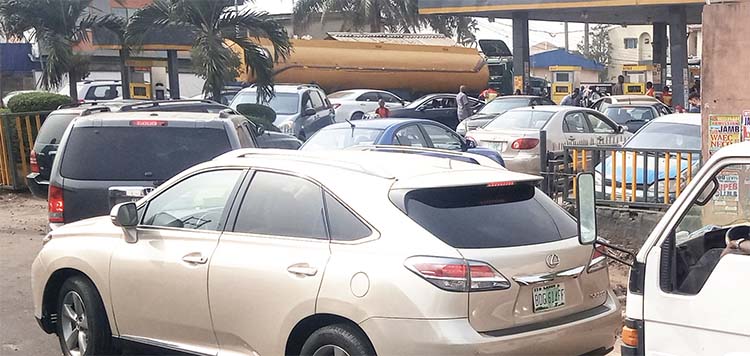Marketers Blame Panic Buying As Fuel Queues Spread
The queues for Premium Motor Spirit (PMS), popularly called petrol, increased in parts of Lagos, Ogun, Abuja, Niger, Nasarawa and few other states as motorists besieged the stations that dispensed the commodity.
But despite the situation, oil marketers stated that there was enough product to keep the country wet throughout the Yuletide season.
They explained that the reasons for queues in the affected states include panic buying by motorists and the high vehicular movements lately.
Reports said that the lengthy queues at filling stations operated by the Nigerian National Petroleum Company Limited were due to the lower rate of the product at NNPCL outlets.
Some marketers, however, described the lower cost at NNPCL stations as detrimental to their businesses and anti-competitive in the downstream oil sector.
In Abuja, it was observed that some major outlets that used to dispense the commodity were locked leading to a massive rush in the few outlets that sold PMS to consumers.
For instance, the Conoil filling station opposite the headquarters of NNPCL in the Central Business District, Abuja, was locked, a development that made motorists form long queues at the nearby Total filling station.
Reports said that the NIPCO and NNPCL outlets on the Kubwa-Zuba Expressway in Abuja had long queues, while many other private outlets on the same road were either closed or did not have products to dispense.
The same scenario played out in Zuba, Niger State, as well as in Mararaba/Nyanya in Nasarawa State, where the few outlets that sold petrol on the major road connecting the state to Abuja, were greeted with queues.
But the National Public Relations Officer, Independent Petroleum Marketers Association of Nigeria, Chief Ukadike Chinedu, said that the queues in Abuja, Lagos and other cities were due to high vehicular movement and panic buying by consumers.
“I can confirm to you that there is enough product to keep the country wet throughout this Yuletide season. The NNPCL has imported enough products, but the truth is that we now have high vehicular movement.
“Also, there is some form of panic buying in those areas you mentioned due to the high population density there. If there is scarcity of product, you can be sure I’ll tell you, but there is no scarcity right now.
“In Port Harcourt and states in the South-East, we don’t have queues, though the cost of product here could be higher than what you get in Lagos. So, we want to tell Nigerians not to be involved in panic buying, because what we have on the ground now should be enough to take the country till the end of the year,” Ukadike said.
Another dealer with the Major Oil Marketers Association of Nigeria confirmed that there was product, but stated that the price war created by NNPCL was counterproductive to downstream operators.
“You will notice that the queues are more pronounced at NNPCL stations, where they sell at N568/litre in Lagos and N617/litre in Abuja, against the cost of about N600/litre in other stations in Lagos and between N640/litre to N650/litre in non-NNPCL stations in Abuja.
“This is anti-competitive for us as marketers; it is not what the Petroleum Industry Act preaches. We think this should be looked into. The NNPCL should not take us out of business because it is the sole importer of petrol.
“And it is the sole importer because it is the only firm that has capacity to access foreign exchange at a reasonable rate and can also shoulder subsidy. This is not a fair market, as far as I am concerned,” the MOMAN member, who pleaded not to be named due to lack of authorisation, stated.
The Chief Corporate Communications Officer, NNPCL, Olufemi Soneye, earlier said that the fuel queues were basically due to what he described as a price war.
“The recent tightness in Abuja is essentially a price war which is typical of any competitive market. Motorists would rather queue at filling stations that offer lower prices than others.
“While NNPC retail is selling at N613/litre in Abuja, other marketers’ prices range from N625-N650/litre,” Soneye stated.
Reports said that NNPCL outlets had more motorists when compared to other private filling stations.
Olusola Akintonde/Punch


Comments are closed.